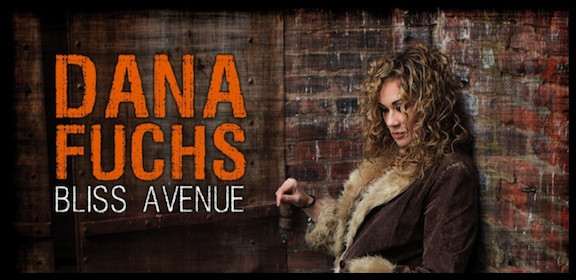
Dana Fuchs is one of the great singers working in Blues, Rock or any other genre working with a controlled power and a broad dynamic range that brings to mind such ‘one name only needed’ vocalists such as Janis, Etta, Nico or Big Mama. (All right, so Big Mama is two names, but you understand the point.)
Ever since her star turn as Sexy Sadie in the film, Across the Universe, musically the songs that usually come to mind in Dana Fuchs’ repertoire have been covers. Besides The Beatles, she is also a nonpareil interpreter of Zeppelin, Etta James and the Janis Joplin canon. With Bliss Avenue, her first album in two years, now she and collaborator Jon Diamond have also joined the ranks of the top songwriting teams. The lyrics are mostly written by Fuchs, with Diamond supplying the music.
Just how good or great an album is Bliss Avenue? A suggestion: The mean and dirty streets of Manhattan have been the setting for many a great novel and movie, with Urban Cowboy perhaps the greatest of the latter. Yet New York’s nasty side it has been wickedly hard to capture in music. There are only two albums that have really nailed the strange oil and water mix of hope and desperation that marks the alleyways in the streets well off Broadway: Lou Reed’s classic New York; and now Bliss Avenue.
These are the songs of survivors who survive because, like Kris Kristofferson’s Bobby McGee, they’ve got nothing else to lose. Indeed, the unnamed woman who goes from party to party with ‘hairy eyes, last night’s make-up running down’ in “Baby Loves the Life” could be Kristofferson’s hitchhiker who finally wound up in New York to find, well to find not much at all. But on she goes, singing ‘lalalalalala’ at the song’s close, laughing her way to Babylon.
What is so vastly entertaining about Bliss Avenue – and has there ever been a more ironic title? – is that it is so, well, entertaining. Dana Fuchs has stepped out from her comfortable persona as the belt ’em out Blues-rocker chick to become a three-dimensional, playful singer-songwriter. Playful shows up when she gives a nod to John Lee Hooker by injecting his ‘How how how’ grumble at the end of “Handful Too Many”, which also has echoes of Come Together running through it. Playful is also in essentially a straight country track, “Nothing On My Mind”, where Dana turns her voice over passim Hank Williams in one line because, one has to think, ‘they said Hank done it this a-way’. A brilliant song unforgettable called “Rodents in the Attic” opens in such a way that one expects Charlie Daniels, not Dana Fuchs, to carry the vocal and then it ends with a repeated guitar chord sounding for all the world like an emergency siren slowly fading away from the literally howling mad woman who needs all the help she can get… but will not find.
Lyrically, Fuchs, along with New York City musicians Kevin Mackall and Ann Klein, have taken the next step into the world of intriguing word play. In the aforementioned “Rodents in the Attic”, there are attention-grabbing yet arrow-perfect lines such as, ‘I got a mattress on my stain’ and ‘I got a semi-automatic and a liver in my pain.’ Those are lines worthy of Charles Bukowski as one can see that rancid mattress with no frame hauled over God only knows horrid memory is embedded on the grey industrial frayed rug.
Where the Lou Reed connection really pops out is on “Daddy’s Little Girl”. This is a gloriously subversive song. Like The Who’s “Sally Simpson”, it is a happy, cheery pop song…provided one does not pay attention to the words. 99 out of 100 songwriters would cast the story of a young woman whose failed relationships lead her to have to come home time and time again in a minor key and likely at a dirge pace as well. But no, not here. It is that sunny pop optimism that keeps the Little Girl going out night after night, believing yet always being wrong. That was Lou Reed’s genius – writing against type in order to create a dialectic that frames the argument. Now that torch is well placed in the hands of Dana Fuchs and Jon Diamond.
Diamond, by the way, always ends up being placed at the caboose end of these reviews and it is utterly unfair. As co-producer, he resists the urge to shove his superb guitar-playing into the forefront, instead allowing it in its many voices to serve as the chamber in which Dana’s voice can best echo. The B3 organ also is allowed frequent opportunities to comment on the songs.
This is a full, complete, rich album of an artist in full command of her thoughts and her vocal instrument. You will love hearing Dana Fuchs sing like the big cats in all the range from a kittenish purr to her lioness’ roar. With wit, intensity and thoughtful words, Bliss Avenue is an album that will bear play after play and then discussion as it is an open conversation from the lonely directed to the listener.


